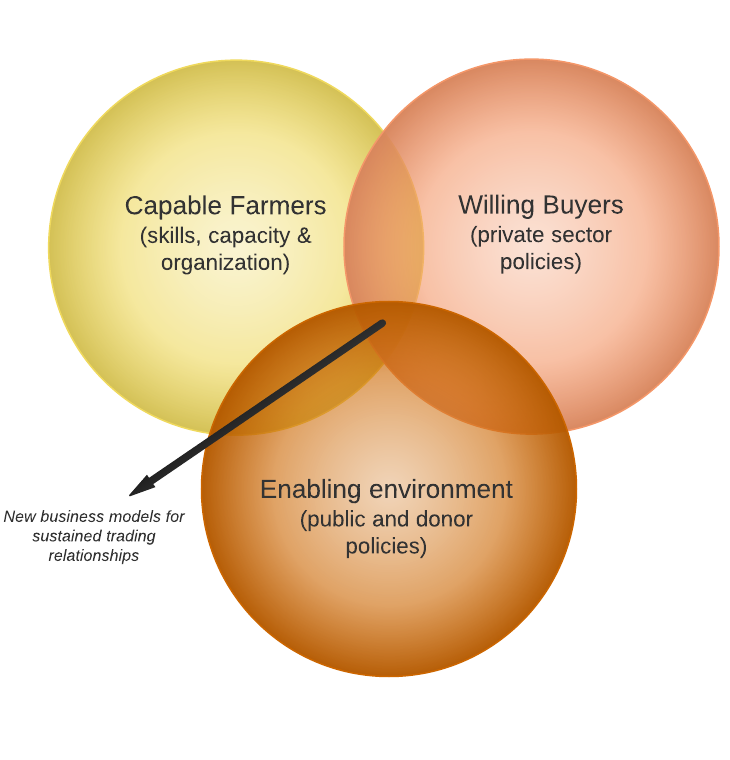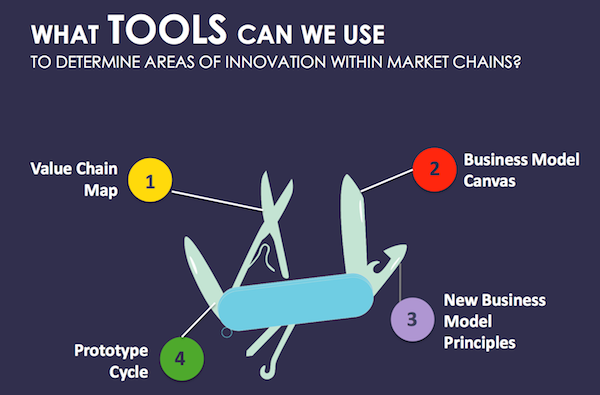LINKing Smallholders : A guide on inclusive business models
Agribusinesses are usually built around a small number of large-scale suppliers ignoring that 85 percent of the world’s farms are managed by small-scale producers. Smallholders are often excluded from modern agribusiness channels due to a lack of access to services, high transaction costs, and poor infrastructure. This, in turn, increases the perceived risks and costs associated with purchasing from large numbers of dispersed producers. While successful examples of smallholder inclusion into modern supply chains can be found, these remain the exception rather than the norm.
Linking smallholders with modern markets is not only a matter of strengthening farmer’s skills and capacities to become better business partners. But also requires the private sector to adjust its business practices to smallholders’ needs and conditions to stimulate sustainable trading relationships. A combination of sound public policies and donor support can contribute to an enabling environment that supports these linkages. Capable farmers and willing buyers, together with an enabling environment can establish trading relationships that are both durable and profitable for both farmers and buyers.
Methodological tools are crucial to bridge the gap between the smallholders in developing countries and the emerging market opportunities in the South and in developed industries.
The Linking Farmers to Markets programme is one of the six thematic areas of the Decision and Policy Analysis (DAPA) research programme at the International Center of Tropical Agriculture’s (CIAT). It has been conducting action research on inclusive business models since 2007 which has been distilled in a participatory guide to Business Models that link smallholders to markets. The LINK Methodology aims to foster inclusive trading relationships between farmer organisations and formal markets.

The LINK Methodology comprises four key tools: They are designed to kick off, implement and conclude a participatory innovation process in a “design-test-check-act” cycle.
Key tool 1 – Value Chain Map: A strongly visual approach to the classic value chain analysis, divided into a nested perspective of core processes, partner network and external influences.
Key tool 2 – The business model canvas: Adapted from Alex Osterwalder’s innovative approach, this participatory tool has proved to be very valuable for small-scale farmers, NGOs and buyers in understanding business goals and practices.
Key tool 3 – The new business model principles: Represent a set of signposts to help evaluate current business practices in terms of their inclusiveness, and to deliver practical ideas on how to enhance a business’s inclusiveness.
Key tool 4 – The prototype cycle: This mixture of iterative learning and formal monitoring and evaluation approaches aims to design, test and evaluate the progress of innovative elements for an existing or new business model on a regular basis. It also helps to decide between up-scaling aspects that work and redesigning elements that fail.

The methodology was developed as part of the New Business Models for Sustainable Trading Relationships Project managed by the Sustainable Food Lab in collaboration with Catholic Relief Services (CRS), the International Center for Tropical Agriculture (CIAT), the International Institute for Environment and Development (IIED), and Rainforest Alliance (RA). This project was supported by a grant from the Bill & Melinda Gates Foundation.
The LINK Methodology bases itself on direct experiences from research projects in several Latin America and African countries, where more than twenty business model case studies have proved to work for small-scale producers. It also builds on the growing literature around business models as a development tool for more effective business processes in the battle against poverty.
The methodology is highly adaptive and the dynamics of the exercises are not carved in stone but should rather be used in the way most beneficial for the involved actors according to their conditions and needs.
The methodology is available both in English (Download English version) and Spanish (Download Spanish Version)
We invite you to help us test this first version in the field and to adapt and improve the tool. If you want to implement our methodology we strongly encourage you to contact us in order to explore how CIAT can engage with you organization. For input or feedback, please use our feedback form.
- Categories
- Agriculture
